The university experience: sweeter than fiction?
[dropcap]U[/dropcap]niversity is a time of transition. A dynamic mix of new people, places and experiences, and loss of old friends and innocence, it’s no wonder that many great writers have found the subject appealing. Six Books writers explore the novels which go beyond using university campuses just as a setting, but as a dynamic part of the drama.
Starter For Ten by David Nicholls
 Set in 1980s Britain, David Nicholls’ Starter For Ten is a brilliant exploration of life as a university student, many elements of which have endured through the decades and are just as relevant for present-day students. Like many Arts students, Brian begins the year with unbridled intellectual curiosity and a desire to become ‘cultured’. However, Nicholls teaches us that there are two kinds of intellectual curiosity, which clash with each other throughout the novel.
Set in 1980s Britain, David Nicholls’ Starter For Ten is a brilliant exploration of life as a university student, many elements of which have endured through the decades and are just as relevant for present-day students. Like many Arts students, Brian begins the year with unbridled intellectual curiosity and a desire to become ‘cultured’. However, Nicholls teaches us that there are two kinds of intellectual curiosity, which clash with each other throughout the novel.
The first kind is initially embodied by Brian’s obsession with University Challenge, which he associates with the warmth of his deceased father’s approval. It is a simple and plain thirst for general knowledge, and is undeniably an admirable way to begin any university course. Yet this is not the sole emotion that propels Brian into his first year. He has a romanticised view of ‘The University Experience’ which involves seducing girls with exotic names with intellectual discourse, drinking fine wines or whiskey without allowing oneself to become completely inebriated, and being able to confidently use words such as ‘eponymous’ in casual conversation. It is the desire to appear knowledgable that is the most dominant in Brian, not the more noble love of knowledge itself.
His painfully pretentious outward performance coupled with his obvious awkwardness and inability to properly socialise is significant to the novel’s usefulness as a guide to university life; trying too hard when you meet new people frequently produces opposite results to the desired effect. His obvious naïveté is plain to everyone he tries to impress. This is evident from his attempts at literary bravado, and the weak ventures into political debate he makes with the left-wing student activist Rebecca Epstein.
In contrast with Rebecca and numerous other characters, Brian’s conversation seems feeble and contrived.
Rebecca, beautiful Alice Harbinson, and University Challenge team leader Patrick Watts all appear to be exceedingly confident and sure of themselves. Nicholls shows us that, to the anxious observer, anyone and everyone can seem miles ahead in status. Though admittedly the performances of the other characters are better maintained than Brian’s, they are all undermined and have their infallibility challenged during the novel.
Starter For Ten is a fantastic book to read before, during, or even years after your time at university. It re-orders our priorities of what to worry about when meeting new people. It is of the highest importance that we should be more concerned about who we are than what we may seem like to others.
Bethan Erasmus
[divider]
Frankenstein by Mary Shelley
Victor Frankenstein’s narrative begins with his growing anticipation to start his studies at the University of Ingolstadt. His thirst for knowledge and 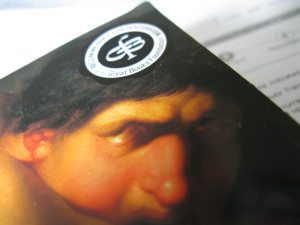 understanding of the world through science at this stage reflects the hopes and eagerness of many people beginning university this year. The young Victor is obsessed with ancient theories about simulating natural phenomenon. When he watches lightning strike a tree, Victor decides to harness the lightning’s power for his experiments. While at university, Victor manages to invent a technique that brings dead tissue to life, and this leads him to attempt a recreation of a human body. The beautiful creation of his imagination instead turns out to be a hideous monster that he can’t even look at (a metaphor for his cruelty, perhaps). He runs away from the Monster, a new-born creature, setting in motion a series of destructive events which quickly spiral out of control.
understanding of the world through science at this stage reflects the hopes and eagerness of many people beginning university this year. The young Victor is obsessed with ancient theories about simulating natural phenomenon. When he watches lightning strike a tree, Victor decides to harness the lightning’s power for his experiments. While at university, Victor manages to invent a technique that brings dead tissue to life, and this leads him to attempt a recreation of a human body. The beautiful creation of his imagination instead turns out to be a hideous monster that he can’t even look at (a metaphor for his cruelty, perhaps). He runs away from the Monster, a new-born creature, setting in motion a series of destructive events which quickly spiral out of control.
The creature, desiring only some compassion from another being, is met with nothing but hatred and repulsion because of his appearance. A creature born into this world with innocent intentions and no desire to hurt anyone is quickly turned into a monster by the world’s refusal to accept him as anything but a monster.
One of the most important morals to be extracted from Frankenstein is that beauty is not just on the outside.
While clichéd at best and downright soppy at worst, this is actually a valid point even today. You will meet so many amazing and different people at university, and not all of them you’ll like. But remember that the people you meet all have their own stories to tell, their own issues to tackle, and potentially a hidden but really great personality, just like Frankenstein’s monster.
University is a time for adventure and a time for stretching your boundaries, both in terms of studi
es and social life. Just try not to create any lonely monsters with abandonment issues, and you’ll probably do alright.
Samantha Hopps
[divider]
Jude the Obscure by Thomas Hardy
Thomas Hardy’s book is certainly not one of the most uplifting novels I have ever read. In fact it is thoroughly depressing, littered with failure, suicide, death and impossible love. However, it does give a fascinating insight into late nineteenth-century society and, in particular, shows how the 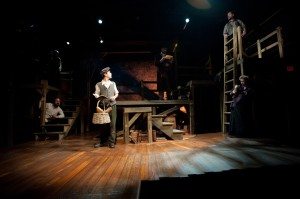 working class were denied a university education. The novel focuses on Jude’s obsession with going to study at ‘Christminster’ (a city modelled on Oxford) and the subsequent disappointment which engulfs his entire existence when he is refused entry.
working class were denied a university education. The novel focuses on Jude’s obsession with going to study at ‘Christminster’ (a city modelled on Oxford) and the subsequent disappointment which engulfs his entire existence when he is refused entry.
In his youth Jude is optimistic, teaching himself Greek and Latin and setting his sights on going to Christminster, depicted as a “heavenly Jerusalem” as Jude looks out at it from his home village of Marygreen. However, when he moves to the city with the aim of fulfilling his ambition, he is immediately rejected from the University on the basis of his class and his lack of finances. Readers then watch as the colleges are transformed from places of heavenly beauty to somewhere full of “gloom, bigotry and decay” in Jude’s eyes. Despite his resultant bitterness towards the place, his obsessive and increasingly desperate desire to study at Christminster endures for the whole novel and it even ends with him dying in the city on Graduation Day.
The novel reflects Thomas Hardy’s own experiences since he, like Jude, was unable to afford a degree at Oxbridge.
His writing expresses disgust at the restrictive nature of society during the Victorian era. I think it is interesting to read this novel and think about how different society is today. In theory, with government loans and grants, university is now accessible to people from all backgrounds. In fact universities themselves try to encourage less well-off students by offering their own grants and scholarships where possible. The novel shows us how things have really changed over the past century and how the ability to attend university really is a privilege we are lucky to have.
Lucy Skoulding
[divider]
Fangirl by Rainbow Rowell
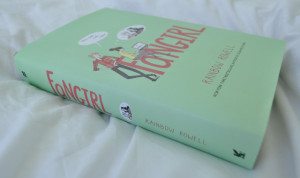 Few, if any, books have delved into the dark underside of the fandom obsessed Tumblr generation – fan fiction. Some bestsellers – most notably Fifty Shades of Grey, one of the fastest selling books ever – began as fan fiction and Meg Cabot, author of the seminal Princess Diaries series cut her teeth writing Star Wars fan fiction, but few writers have gone the other way and written about its authors.
Few, if any, books have delved into the dark underside of the fandom obsessed Tumblr generation – fan fiction. Some bestsellers – most notably Fifty Shades of Grey, one of the fastest selling books ever – began as fan fiction and Meg Cabot, author of the seminal Princess Diaries series cut her teeth writing Star Wars fan fiction, but few writers have gone the other way and written about its authors.
Rainbow Rowell is one of the first to do so in Fangirl, which begins with the protagonist, Cath, starting in her first year at university. Cath spends most of her free time writing Simon Snow fan fiction (a lightly disguised homage to Harry Potter – itself another huge source for fan fiction). Her introverted and shy nature isolates her from the other students, not helped by the fact her more sociable twin is living in another hall with her own roommate.
But while Cath is shy in real life, on the internet she’s ‘Magicath’, one of the most popular Simon Snow fan fiction authors whose series, Carry On Simon, has millions of views. Her journey to resolving her double life and coming out of her shell is a new version of the traditional coming of age story in the digital age.
Both a daunting and exciting experience, Freshers isn’t easy for everyone.
Fangirl explores the difficulty many face with moving home and feeling intensely lonely. Cath herself is an engaging protagonist, and the excerpts of her writing dispersed within the main story charting the process of her online life. Fangirl was picked as the inaugural book for the Tumblr book club, and special editions of the book with illustrations have already been released, proving its popularity. Although the story itself is fairly predictable and there is little deviation from the traditional coming of age plot, the engaging characters make Fangirl highly relatable and an interesting modern take on a classic idea.
Emily Stevenson
[divider]
The Secret History by Donna Tartt
In The Secret History, narrator Richard Papen attends Hampden University, where he enrols in an elite Ancient Greek class. It is not the subject, however, but the five other students on the course that fascinate him. As the year progresses, Richard becomes entangled in the lives of these other students, realising too late that in doing so he has sealed his fate.
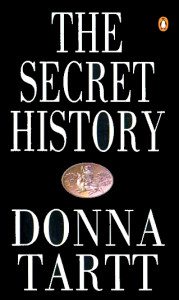 It’s the writing that makes The Secret History so good; Donna Tartt turns sinister prodigies with murderous tendencies into characters that you genuinely care about. She has a gift for suspense, completely saturating mundane activities in tension and making the book so readable. The novel is particularly satisfying for students. Tartt animates Richard with a familiar desperation to belong, which leads him into morally murky waters. The pressure of making close friends in a very short amount of time is a problem faced by many students. Alcohol, Richard discovers, makes forging these new alliances easier and, like many first-years, the cast of The Secret History are drinking constantly. Unlike most first-years, however, they drink in order to suppress dark memories, knowing that, if they faced their problems, the guilt would be overwhelming. Most first-years won’t (hopefully) have to deal with that.
It’s the writing that makes The Secret History so good; Donna Tartt turns sinister prodigies with murderous tendencies into characters that you genuinely care about. She has a gift for suspense, completely saturating mundane activities in tension and making the book so readable. The novel is particularly satisfying for students. Tartt animates Richard with a familiar desperation to belong, which leads him into morally murky waters. The pressure of making close friends in a very short amount of time is a problem faced by many students. Alcohol, Richard discovers, makes forging these new alliances easier and, like many first-years, the cast of The Secret History are drinking constantly. Unlike most first-years, however, they drink in order to suppress dark memories, knowing that, if they faced their problems, the guilt would be overwhelming. Most first-years won’t (hopefully) have to deal with that.
The book drifts by like a hangover: dimly-lit, slightly hazy, with bouts of amnesia.
It’s a slow-burner, with no clear climax; the structure wanders aimlessly before dragging the reader back in by the scruff of the neck, saving them from wandering, in a drunken haze, straight off the edge of a cliff. And yet, The Secret History isn’t a particularly emotional book, and many say that they find it hard to connect to the characters because none of them are particularly likeable.
Indeed, it’s difficult to think of a redeeming trait between all six of them – except that Francis dresses well – but this isn’t the real point. Tartt doesn’t want you to like her characters. She wants you to observe them coolly, casually, in the way the characters themselves operate. She wants you to speculate about the darker areas of the plot, come to a conclusion and then catch yourself in the act, disgusted at the deviation from your own moral compass. The Secret History is not populated by nice characters but, unfortunately, neither is the world. And sometimes, the not-so-nice people are very clever.
Ellen Lavelle
[divider]
Discworld by Terry Pratchett
You don’t get many fantasy novels which feature institutions of higher learning, probably because most people’s fantasies are not heavily inclined towards more hours in school.
But the Unseen University of Terry Pratchett’s Discworld books, premier institution for the education of young wizards, is a pivotal set piece of the series. UU is featured in over half the instalments of the forty-book series epic, and is home to some of its most recognisable characters.These include the Librarian (a 300lb book-loving orangutan), Ponder Stibbons (inventor of Discworld’s incarnation of the supercomputer), and Professor Rincewind (Egregious Professor of Cruel and Unusual Geography, Lecturer in Approxiamate Accuracy, occasional saviour of the Disc and everything else the other wizards don’t want to do).
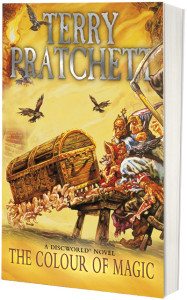 There are almost no depictions of a student actually studying at UU, an attitude heartily endorsed by most of the senior wizards. It is generally understood that the most responsible way to use magic is to not do any magic at all, thus allowing the establishment’s prominent staff to pursue their more urgent passions of sleeping and eating big dinners.
There are almost no depictions of a student actually studying at UU, an attitude heartily endorsed by most of the senior wizards. It is generally understood that the most responsible way to use magic is to not do any magic at all, thus allowing the establishment’s prominent staff to pursue their more urgent passions of sleeping and eating big dinners.
So why bother with the University at all? Discworld, and the City of Ankh-Morpork in particular, live within walls of reality that are so thin you could poke a finger through them (this happens about once a week, usually by a wizard). Such things usually have terrifying magical consequences, and University staff are generally required to fend off insurgent Lovecraftian horrors from the so-called Dungeon Dimensions. The understanding between the City and the University is that the University will always assist the City in times of distress when asked, as long as the City promises never to ask them, but the wizards of UU are usually enthusiastically involved in every fad, scheme and calamity that befalls the City, magical consequences be damned. These include but aren’t limited to the introduction of rock music to the Discworld, the invention of cinema, outbreaks of undead and the legalisation of Football.
Pratchett created his university and its wizards to satirize many things, including particle physics, the nature of the internet, various Lord of the Rings characters and British academia. So vast and sprawling is the world-building of Discworld that the Ankh-Morpork university is only one facet of an infinitely fascinating and complex series. Don’t be put off by the number of books. If you’re looking for something good to read, you could do far worse than Pratchett.
Hannah Froggatt
[divider]
Image Credits: Header (Flickr/Francisco Osorio), Image 1 (comicbooksandmoviereviews.com), Image 2 (Flickr/Rob Pongsajapan), Image 3 (triangleartsandentertainment.com), Image 4 (Tumblr/Laurengetsbooked), Image 5 (Pinterest), Image 6 (terrygilliam.com).

Comments